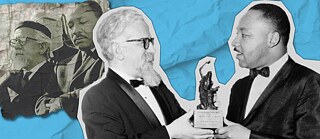Abraham Joshua Heschel, largely unknown in Germany, was one of the most influential Jewish thinkers of the 20th century, as well as a theologian, philosopher, and activist.
In any free society where terrible wrongs exist, some are guilty – all are responsible.
Abraham Joshua Heschel's remarkable story is shaped by the horrors of the 20th century. Born in 1907 into a Hasidic Jewish family of Rabbis, he was the youngest of six siblings and grew up in Warsaw and Vilnius. His early education was rich in languages and Jewish theology, leading him to study at the "Hochschule für die Wissenschaft des Judentums" (Higher Institute for Jewish Studies) in Berlin, where he earned his doctorate in 1932, just a year before the Nazis rose to power.
In 1938, Heschel was arrested in Berlin by the Gestapo (Nazi secret state police) and deported to Poland. Ten months later, he fled to England and subsequently to the United States, narrowly escaping the German invasion of Poland. Most of his family, including his mother and sisters, were murdered in the Holocaust.
In the United States, Heschel initially taught at Hebrew College in Cincinnati. From 1945 onwards, he served as a professor of Jewish ethics and mysticism at the Jewish Theological Seminary of America in New York.
Heschel's Role in the American Civil Rights Movement
Due to his biography, Heschel understood the value of solidarity. As a devout Jew, he believed it was his duty to stand up for oppressed people, including Black Americans. Julian Zelizer, a leading historian at Princeton University, highlights Heschel’s conviction that anyone who did not support the civil rights movement could not be truly religious. According to Heschel, racism was inevitably a form of Satanism or blasphemy.There can be no neutrality. Either we are ministers of the sacred or slaves of evil.
Dr. King had said of Heschel, “Rabbi Heschel is one of the persons who is relevant at all times, always standing with prophetic insights.” And Heschel had said of King, “His presence is the hope of America. His mission is sacred, his leadership of supreme importance to every one of us.”
Despite their different backgrounds – King, a Black Christian from the United States, and Heschel, a white Jew from Poland – the two men shared significant similarities. Both grew up in societies marked by systemic racism and oppression, both were deeply religious and interested in philosophy, and both were united by their conviction that they had to stand up against injustice and make their voices heard through activism.
Therefore, Heschel followed the call to join Dr. King's march from Selma to Montgomery. On March 21, 1965, King and Heschel led thousands of peaceful demonstrators to the Capitol, Alabama's seat of government, to protest for the right of Black people to vote in the United States. Heschel later said that it felt like “his legs were praying”. This moment was an important sign of interfaith and intercultural solidarity.
Heschel's vision is more relevant today than ever. Showing solidarity across national, religious or ethnic boundaries is the cornerstone of peaceful coexistence. It is necessary to show compassion, not only to those who are similar to us, but also to those who are different. As Heschel said: “No religion is an island” – it is worth thinking outside the box.
Heschel's alliance with King demonstrates that true solidarity is not about erasing differences but embracing them as a foundation for deeper connection. It is the art of cultivating empathy for others and working together for a more just and equitable world.
Few of us seem to realize how insidious, how radical, how universal an evil racism is. Few of us realize that racism is man’s gravest threat to man, the maximum of hatred for a minimum of reason, the maximum of cruelty for a minimum of thinking.
